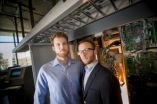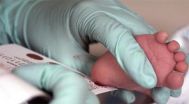(Press-News.org) Providing futile treatment in the intensive care unit sets off a chain reaction that causes other ill patients needing medical attention to wait for critical care beds, according to a study by researchers from UCLA and RAND Health.
The study is the first to show that when unbeneficial medical care is provided, others who might be able to benefit from treatment are harmed, said study lead author Dr. Thanh Huynh, an assistant professor of medicine in the division of pulmonary and critical care medicine at the David Geffen School of Medicine at UCLA.
The findings also have implications for the fairness of the American healthcare system, and points toward needed policy improvements to more efficiently use limited healthcare resources, said senior author Dr. Neil S. Wenger, a UCLA professor of medicine, a RAND Health scientist and director of the UCLA Health Ethics Center at the David Geffen School of Medicine at UCLA.
"Many people do not realize that there is a tension between what medicine is able to do and what medicine should do. Even fewer realize that medicine is commonly used to achieve goals that most people, and perhaps most of society, would not value – such as prolonging the dying process in the intensive care unit when a patient cannot improve," Wenger said. "But almost no one recognizes that these actions affect other patients, who might receive delayed care or, worse, not receive needed care at all because futile medical treatment was provided to someone else."
The study appears in the August issue of the peer-reviewed journal Critical Care Medicine.
For the study, the research team surveyed critical care physicians in five ICUs in one health system to identify patients that the clinicians identified as receiving treatment that would not help them get better. They then identified days when an ICU was full and contained at least one patient receiving futile treatment and looked at the number of patients waiting for ICU admission for more than four hours in the emergency department or more than one day for transfer from an outside hospital.
The study showed that on 16% of days when an ICU was full, it contained at least one patient receiving futile treatment. During those days, 33 patients were kept in the emergency department for more than four hours, nine patients waited more than one day to be transferred from an outside hospital and 15 patients canceled their transfer request after waiting more than one day. Two patients died at outside hospitals while waiting to be transferred into the academic medical center ICU.
"These findings should contribute to the public debate about the use of limited healthcare resources and whether limitations should be placed on using those resources for treatments that physicians feel will not benefit patients," Wenger said. "To date, healthcare payers have been willing to pay for any life-sustaining treatment that has already been started and the public has been unwilling to discuss the trade-offs silently made between patients receiving futile treatment and patients not receiving the treatment they need. This study demonstrates that those trade-offs occur and can be measured."
Huynh said that going forward, the research team hopes to develop interventions to decrease instances of hospitals providing critical care to patients for whom there will be no benefit.
"With advances in medicine and technology, the ICU is now able to save lives as well as prolong the dying process," Huynh said. "Because resources are not unlimited, patients receiving futile treatment can mean delayed or even denied access to care for other patients in need. This needs to change."
"It is unjust when a patient is unable to access intensive care because ICU beds are occupied by patients who cannot benefit from such care. Our findings are particularly relevant in the U.S., but are also instructive elsewhere given universal concerns regarding providing treatments that are non-beneficial," the study states. "The ethic of 'first come, first served' is not only inefficient and wasteful, but it is contrary to medicine's responsibility to apply healthcare resources to best serve society. In the context of healthcare reform, which aims to more justly distribute medical care to the nation, opportunity cost is one more reason that futile treatment should be minimized."
INFORMATION:
The study was funded by the late philanthropist Mary Kay Farley in a donation to RAND Health.
Providing futile care in the ICU prevents other patients from receiving critical care
2014-08-20
ELSE PRESS RELEASES FROM THIS DATE:
Novel gene predicts both breast cancer relapse and response to chemotherapy
2014-08-20
Singapore—Scientists have made it easier to predict both breast cancer relapses and responses to chemotherapy, through the identification of a unique gene. The newly found marker could help doctors classify each breast cancer patient and customise a treatment regimen that is more effective. The discovery was a collaborative effort by scientists from A*STAR's Institute of Molecular and Cell Biology (IMCB), and the Cancer Science Institute of Singapore (CSI Singapore) at the National University of Singapore (NUS).
Despite advancements in cancer treatment, breast cancer ...
Record decline of ice sheets
2014-08-20
"The new elevation maps are snapshots of the current state of the ice sheets. The elevations are very accurate, to just a few metres in height, and cover close to 16 million km2 of the area of the ice sheets. This is 500,000 square kilometres more than any previous elevation model from altimetry", says lead-author Dr. Veit Helm, glaciologist at the Alfred Wegener Institute in Bremerhaven.
For the new digital maps, the AWI scientists had evaluated all data by the CryoSat-2 altimeter SIRAL. Satellite altimeter measure the height of an ice sheet by sending radar or laser ...
Researchers find security flaws in backscatter X-ray scanners
2014-08-20
A team of researchers from the University of California, San Diego, the University of Michigan, and Johns Hopkins University have discovered several security vulnerabilities in full-body backscatter X-ray scanners deployed to U.S. airports between 2009 and 2013.
In laboratory tests, the team was able to successfully conceal firearms and plastic explosive simulants from the Rapiscan Secure 1000 scanner. The team was also able to modify the scanner operating software so it presents an "all-clear" image to the operator even when contraband was detected. "Frankly, we were ...
Testing the shelf-life of nuclear reactors
2014-08-20
Oxford, August 20, 2014 – Researchers at the University of Michigan, Ann Arbor, Los Alamos National Laboratory, Idaho National Laboratory, Idaho Falls and TerraPower based in Bellevue, Washington, have demonstrated the power of high-energy beams of charged particles (ions). The ions can rapidly and consistently damage samples of ferritic-martensitic steel, the material used in certain nuclear reactor components. The significance of the result is that the breakdown closely replicates that seen when high-energy neutrons from a nuclear reactor interact with the material - ...
Chemically extracted acellular allogeneic nerve graft with CNTF for sciatic nerve repair
2014-08-20
Chemically extracted acellular allogeneic nerve, from which Schwann cells, myelin sheath and disintegrating fragments have been removed, reduced postoperative immune rejection. Simultaneously, chemically extracted acellular allogeneic nerve retains neural substrates and base materials, such as the bottom layer of Schwann cells, which can provide a good scaffold in the process of nerve regeneration. Chemically extracted acellular allogeneic nerve, similar to autologous nerve transplantation, can guide nerve regeneration and provide a favorable local environment for neural ...
The channel that relaxes DNA
2014-08-20
VIDEO:
This is a model DNA chain inside a nanochannel that is 100nm wide.
The spontaneous dynamical evolution of the DNA is accompanied by frequent knotting and entanglement at the chain ends....
Click here for more information.
With the widespread use of methods for DNA analysis and manipulation, it's certainly useful to find a way to unravel and relax the strands of this molecule that tends to form tangles spontaneously. One way is to use channels, or rather nano-channels, ...
Test reliably detects inherited immune deficiency in newborns
2014-08-20
A newborn screening test for severe combined immunodeficiency (SCID) reliably identifies infants with this life-threatening inherited condition, leading to prompt treatment and high survival rates, according to a study supported by the National Institutes of Health. Researchers led by Jennifer Puck, M.D., of the University of California, San Francisco, also found that SCID affects approximately 1 in 58,000 newborns, indicating that the disorder is less rare than previously thought. The study was funded in part by NIH's National Institute of Allergy and Infectious Diseases ...
Mums trust mums on the net: Australian study
2014-08-20
Facebook groups for mothers are overtaking the traditional mums-and-bubs and playgroup environments as a source of trusted advice, and offers a largely untapped marketing tool for businesses wanting to sell their products, an Australian study has found.
QUT educationalist Dr Rebecca English and marketing expert Dr Raechel Johns from the University of Canberra said word-of-mouth in mothers' groups and communities had fast become a major influence in mothers' buying habits.
The study, Mothers' influencing mothers: the use of virtual discussion boards and their influence ...
Sunblock poses potential hazard to sea life
2014-08-20
The sweet and salty aroma of sunscreen and seawater signals a relaxing trip to the shore. But scientists are now reporting that the idyllic beach vacation comes with an environmental hitch. When certain sunblock ingredients wash off skin and into the sea, they can become toxic to some of the ocean's tiniest inhabitants, which are the main course for many other marine animals. Their study appears in the ACS journal Environmental Science & Technology.
Antonio Tovar-Sanchez and David Sánchez-Quiles point out that other than staying indoors, slathering on sunscreen is currently ...
Diabetes calculator helps identify A&E patients at risk of disease
2014-08-20
A new online tool will help doctors predict which patients are most likely to develop diabetes.
The calculator will help doctors identify high risk patients so that they can be tested for the disease and offered lifestyle advice. The test is targeted at people who have been admitted to hospital for emergency care.
Experts say it could offer a cost-effective way to identify people with diabetes in Scotland as it avoids the need for significant investment in screening.
The test calculates a person's risk of developing diabetes over the next three years based on their ...





